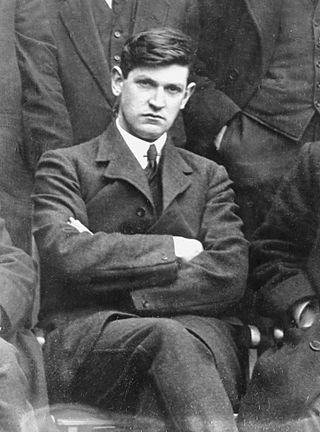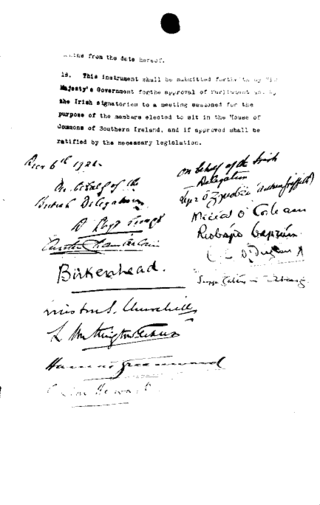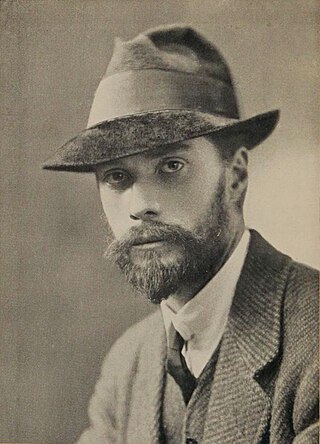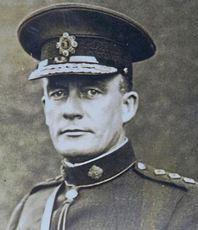Related Research Articles

The Irish Republican Army was an Irish republican revolutionary paramilitary organisation. The ancestor of many groups also known as the Irish Republican Army, and distinguished from them as the "Old IRA", it was descended from the Irish Volunteers, an organisation established on 25 November 1913 that staged the Easter Rising in April 1916. In 1919, the Irish Republic that had been proclaimed during the Easter Rising was formally established by an elected assembly, and the Irish Volunteers were recognised by Dáil Éireann as its legitimate army. Thereafter, the IRA waged a guerrilla campaign against the British occupation of Ireland in the 1919–1921 Irish War of Independence.

The Irish Civil War was a conflict that followed the Irish War of Independence and accompanied the establishment of the Irish Free State, an entity independent from the United Kingdom but within the British Empire.

The 1920s was a decade that began on January 1, 1920, and ended on December 31, 1929. Primarily known for the economic boom that occurred in the Western World following the end of World War I (1914–1918), the decade is frequently referred to as the "Roaring Twenties" or the "Jazz Age" in America and Western Europe, and the "Golden Twenties" in Germany, while French speakers refer to the period as the "Années folles" to emphasize the decade's social, artistic, and cultural dynamism.

Éamon de Valera was an American-born Irish statesman and political leader. He served several terms as head of government and head of state and had a leading role in introducing the 1937 Constitution of Ireland.

The Irish Free State, also known by its Irish name Saorstát Éireann, was a state established in December 1922 under the Anglo-Irish Treaty of December 1921. The treaty ended the three-year Irish War of Independence between the forces of the Irish Republic – the Irish Republican Army (IRA) – and British Crown forces.

Michael Collins was an Irish revolutionary, soldier and politician who was a leading figure in the early-20th century struggle for Irish independence. During the War of Independence he was Director of Intelligence of the Irish Republican Army (IRA) and a government minister of the self-declared Irish Republic. He was then Chairman of the Provisional Government of the Irish Free State from January 1922 and commander-in-chief of the National Army from July until his death in an ambush in August 1922, during the Civil War.

The 1921 Anglo-Irish Treaty, commonly known in Ireland as The Treaty and officially the Articles of Agreement for a Treaty Between Great Britain and Ireland, was an agreement between the government of the United Kingdom of Great Britain and Ireland and the government of the Irish Republic that concluded the Irish War of Independence. It provided for the establishment of the Irish Free State within a year as a self-governing dominion within the "community of nations known as the British Empire", a status "the same as that of the Dominion of Canada". It also provided Northern Ireland, which had been created by the Government of Ireland Act 1920, an option to opt out of the Irish Free State, which was exercised by the Parliament of Northern Ireland.

The Irish War of Independence or Anglo-Irish War was a guerrilla war fought in Ireland from 1919 to 1921 between the Irish Republican Army and British forces: the British Army, along with the quasi-military Royal Irish Constabulary (RIC) and its paramilitary forces the Auxiliaries and Ulster Special Constabulary (USC). It was part of the Irish revolutionary period.
Events from the year 1922 in Ireland.
Events from the year 1921 in Ireland.

Harry Boland was an Irish republican politician who served as President of the Irish Republican Brotherhood from 1919 to 1920. He served as a Teachta Dála (TD) from 1918 to 1922.

Brendan Gleeson is an Irish actor. He has received various accolades, including a Primetime Emmy Award, two British Independent Film Awards and three IFTA Awards, along with nominations for an Academy Award, three BAFTA Awards and five Golden Globe Awards. In 2020, he was listed at number 18 on The Irish Times list of Ireland's greatest film actors. He is the father of actors Domhnall Gleeson and Brian Gleeson.

Darrell Edmund Figgis was an Irish writer, Sinn Féin activist and independent parliamentarian in the Irish Free State.

Michael Parks was an American singer and actor who made numerous film and television appearances, notably starring in the 1969–1970 series Then Came Bronson. He was widely known for his work in his later years with filmmakers such as Quentin Tarantino, Robert Rodriguez, and Kevin Smith.

The Irish Republican Army (IRA) of 1922–1969 was a sub-group of the original pre-1922 Irish Republican Army, characterised by its opposition to the Anglo-Irish Treaty. It existed in various forms until 1969, when the IRA split again into the Provisional IRA and Official IRA.
Sinn Féin is the name of an Irish political party founded in 1905 by Arthur Griffith. It became a focus for various forms of Irish nationalism, especially Irish republicanism. After the Easter Rising in 1916, it grew in membership, with a reorganisation at its Ard Fheis in 1917. It split in 1922 in response to the Anglo-Irish Treaty which led to the Irish Civil War and saw the origins of Fianna Fáil and Fine Gael, the two parties which have since dominated Irish politics. Another split in the remaining Sinn Féin organisation in the early years of the Troubles in 1970 led to the Sinn Féin of today, which is a republican, left-wing nationalist and secular party.

The Battle of Dublin was a week of street battles in Dublin from 28 June to 5 July 1922 that marked the beginning of the Irish Civil War. Six months after the Anglo-Irish Treaty ended the recent Irish War of Independence, it was fought between the forces of the new Provisional Government and a section of the Irish Republican Army (IRA) that opposed the Treaty.

Eamon "Ned" Broy was successively a member of the Dublin Metropolitan Police, the Irish Republican Army, the National Army, and the Garda Síochána of the Irish Free State. He served as Commissioner of the Gardaí from February 1933 to June 1938. He later served as president of the Olympic Council of Ireland for fifteen years.

James Emmet Dalton MC was an Irish soldier and film producer. He served in the British Army in the First World War, reaching the rank of captain. However, on his return to Ireland he became one of the senior figures in the Dublin Brigade of the guerrilla Irish Republican Army which fought against British rule in Ireland.

Michael Collins is a 1996 biographical historical drama film about Michael Collins, a leading figure in the early-20th-century Irish struggle for independence against Britain. It is written and directed by Neil Jordan and stars Liam Neeson in the title role, along with Aidan Quinn, Stephen Rea, Alan Rickman, and Julia Roberts. The film was distributed by Warner Bros.
References
- ↑ Connelly, Mark (10 January 2014). The IRA on Film and Television: A History. McFarland. p. 250. ISBN 978-0-7864-8961-9.
- ↑ Pettitt, Lance (2000). Screening Ireland: Film and Television Representation. Manchester University Press. p. 242. ISBN 978-0-7190-5270-5.